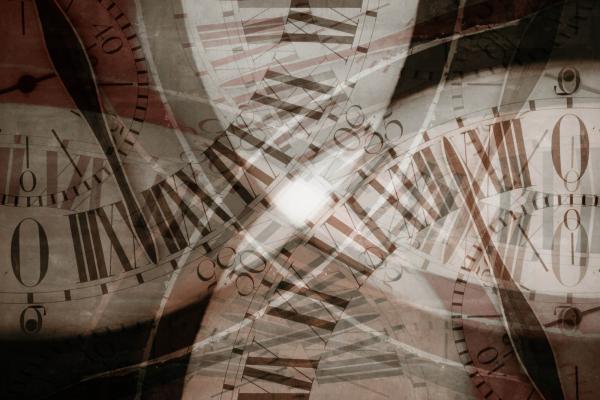“I’m learning to take the long view of time, but it’s not easy,” my former student told me on a warm afternoon as we sat on the porch of my campus duplex. Our view overlooked a bright green pasture populated by an assemblage of newborn calves, their nursing mothers, and an adolescent male cow whom my daughter nicknamed “Social” for his propensity to follow humans rather than fear them.
This pastoral vantage point was far away from my student Jamie DeMarco’s work in Washington, D.C., at the office of the Friends Committee on National Legislation located across the street from the Hart Senate Office Building. In this capacity, he lobbies for nuclear disarmament, a job with newfound relevance given the current administration. Tracking his Facebook posts, I once joked that Jamie was participating in a daily protest, much like taking a daily multivitamin: “A protest a day keeps the fascists away,” he posted.
As an undergrad, he wore one faded blue T-shirt for most of the year, an active pledge to decrease his own consumerism. Now he often dresses for work in a button-down shirt, khakis, and tie when he meets with congressional staffers or visits the United Nations — while donning his pink pussy hat for weekend protests. In fact, he and his mother were arrested while protesting in front of the state capital in Maryland, urging lawmakers to ban the practice of fracking to extract natural gas from the ground.
“I wasn’t sure how my mom was going to do in jail,” he admitted, “but she got out before I did and seemed just fine.”
As we watched the black calves frolic like toddlers, Jamie shared that his mentor at the Friends Committee had died suddenly last year. He worked his entire career — decades of advocacy — lobbying against nuclear weapons during a time period when the world slowly eliminated 85 percent of its nuclear weapons.
“I would ask him: 'Are we going to get the Test Ban Treaty passed in the Senate?'” Jamie said. “And he would always respond that we’ll get it passed. It might be 10 or 15 years, but we’ll get it passed.”
We talked about the anxiety of our current times in this country, when every morning brings a surreal headline, a shocking calamity, another critical call for action to protect justice for all people. Most of his mentors in the past emphasized the real urgency of causes like climate change, but he was recognizing the need to integrate a longer perspective of time as well.
His reflection reminded me of author Mary Ellen Hannibal’s description of two types of time in her book Citizen Scientist: Searching for Heroes and Hope in an Age of Extinction. She writes about chronos as the immediate passage of time that propels us to our next gathering with friends or creates an adrenaline rush around an impending deadline. The second type of time is kairos, the realization of all time — past, present, and future — always with us.
How can we learn to mark time, both chronos and kairos, when so many immediate crises seem to manifest as we sleep through each night? I want to learn to hold both types of time, even when I wake up anxious about the world on any given day. And that means I’ll need to practice mercy with myself and others, which isn’t always easy in hard times. At any given point, I can only be in one place in time.
So that afternoon I listened to Jamie share his plan to start a nonprofit called the Maryland Clean Energy Jobs Initiative in his home state, where the Republican governor decided to ban fracking. Similarly, another former student of mine is the lead plaintiff on a case, Juliana v. United States, suing the federal government for failure to protect youth from the impacts of climate change.
In the streets and in the courts, young people whom I know are acting with immediate urgency but investing in the long haul with sustained energy in alliance with others. It’s much like holding a note in a chorus by allowing different singers to take a breath at different points in time. And I have to do the same, even as I worry in one breath about the unseasonably warm winter this year, the casserole I am cooking for a friend with cancer, the unraveling of the Clean Power Act, and the daily drama in my small household of three girls.
How do we tell time in hard times? I don’t have a simple answer, but for me, one place to start is by looking outside myself to others who seem to stay grounded but engaged. As Jamie and I wrapped up our visit, we talked about seeking those activists who have a lightness about them, those who are working for justice, without dragging others down with the overwhelming severity of the cause or sarcasm about the possible futility of the fight. Perhaps that lightness will help us to realize that we can’t do everything, but we can dig in and do something that matters with others. The long view — of a pasture or a lifetime — isn’t an escape from crisis but an acceptance that despair is not a long-term strategy in these times.
Got something to say about what you're reading? We value your feedback!

